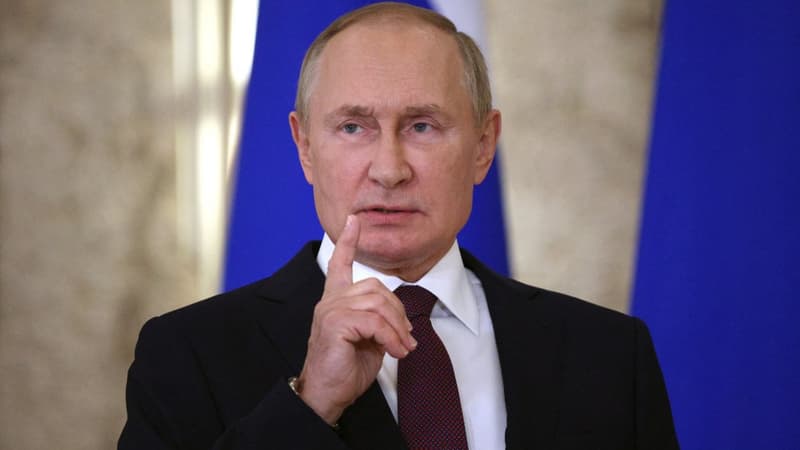Since the invasion of Ukraine by Russia on February 24 of last year, the West – the United States and the European Union at the helm – have multiplied the sanctions against the Moscow regime with the aim of weakening its economy and reducing its capacity for warfare. . Oil, commerce, finance, transport, technology… In total, more than 12,000 individual measures would affect the country, its organizations and its personalities. Summary of the main restrictions imposed on Russia one year after the start of hostilities.
Western powers are trying to move away from Russian black gold
Russia is on the podium of the world’s largest oil exporters. In fact, the health of its economy largely depends on its trade in hydrocarbons, especially since it is also number one in gas. In order to hit the wallet without weakening too much, the Europeans, the United States and their allies have decided to close, or almost, their Russian oil windfall.
Although the Americans quickly imposed an embargo, it is only since December that no ship has been allowed to dock at a European port to unload Russian crude. For refined products, which include diesel, heating oil and kerosene, a similar ban recently went into effect on February 5. A blow for Russia, almost 90% of whose oil arrives by ship to the old continent, but also for European countries, some of which were largely supplied in Russia and now must find alternatives.
In addition to the embargo, Europe and the G7 have agreed to cap the price of Russian oil at $60 a barrel, a move that should reduce the revenue Russia earns from its oil exports to third countries.
Despite these successive rounds of sanctions targeting the Russian energy sector, Moscow has so far found ways around the embargoes in place through other countries such as India or Pakistan.
Exclusion from the global banking system
Several Russian banks can no longer use SWIFT. This banking information transfer system, which is relatively unknown to the general public, is nevertheless an essential mechanism for international financial exchanges. Among other things, it is at the origin of the BIC code that allows banks to authenticate and thus facilitate payment orders between organizations. It connects more than 11,000 organizations in more than 200 countries.
No longer having access to the SWIFT network complicates Russian banks’ exchange of funds with their counterparties around the world. The sanction, however, is double-edged: the opposite is also true. In addition, Moscow, for several years, has developed alternatives to this system.
On the financial side, several Western powers also quickly decided to freeze the foreign reserves that the Russian central bank has at home.
Of the $643 billion in gold and dollars the bank has hoarded abroad over the years, more than half would be frozen, according to an EU estimate, limiting the country’s ability to support the value of its currency, the ruble.
Weapons, advanced technologies… what Russia can no longer buy
Russia and the major Western countries have not stopped trading. However, there are certain products that the Russian Federation can no longer obtain directly from the major Western powers. This specific list contains, in particular, advanced technologies, and among them, the precious advanced semiconductors: aircraft, weapons or even luxury products. Most of the bans serve to undermine Russian military capabilities.
By contrast, certain products made in the world’s largest country are no longer supposed to cross the borders of the European Union, the United States and their allies. Gold, steel, coal, wood, caviar or even vodka, Russia must find alternative routes to sell its products.
In addition to the limits on imports and exports, hundreds of companies around the world have announced their withdrawal or suspension of their activities in Russia after its invasion of Ukraine last year. Yale’s Institute for Executive Leadership had more than 1,000 in mid-February.
Personalities under sanctions
Westerners have also decided to directly attack Russian personalities. For these, they are no longer allowed to travel or recover the money they had deposited in the foreign banks of the countries that instigated these sanctions. More anecdotally, they can no longer enjoy their yachts, villas, planes or other luxury goods…
The European Union has almost 1,400 people who are currently under these restrictions, some for longer. In the foreground is, as expected, the Russian president, Vladimir Putin, then we find his foreign minister, “leading” businessmen or even oligarchs “linked to the Kremlin”.
The picture is not complete. We could also mention the closure of the airspace of Western powers to Russian planes or the suspension of certain media such as Russia Today or Sputnik.
Russia has responded almost blow by blow to sanctions whose effectiveness is routinely praised by Western governments, while Vladimir Putin said last September that his country “has lost nothing and will lose nothing.” In addition to a ground war in Ukraine that many predict will be long, the economic battle is likely to last as well. A question arises: has the Western coalition really succeeded in bringing down the Russian economy? While Vladimir Putin defended his economic record in a February 21 address to the Russian Nation, for the French president “the Russian economy is suffering.”
Source: BFM TV


